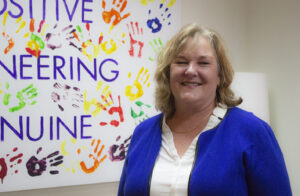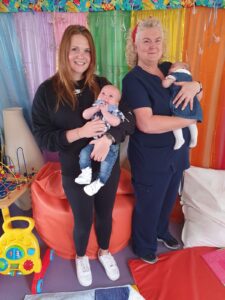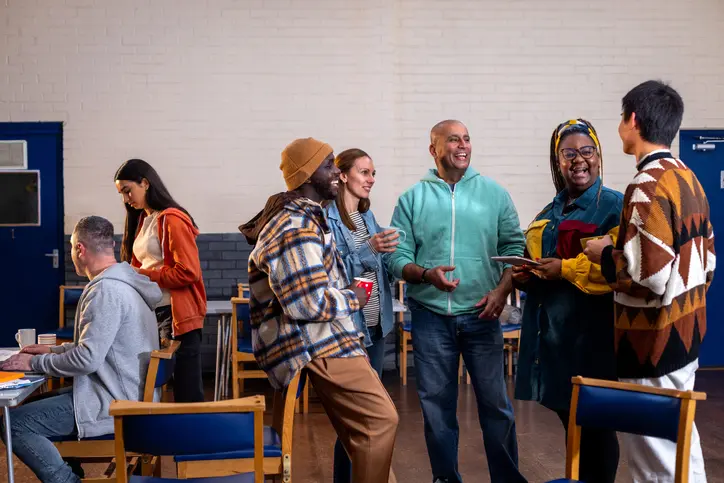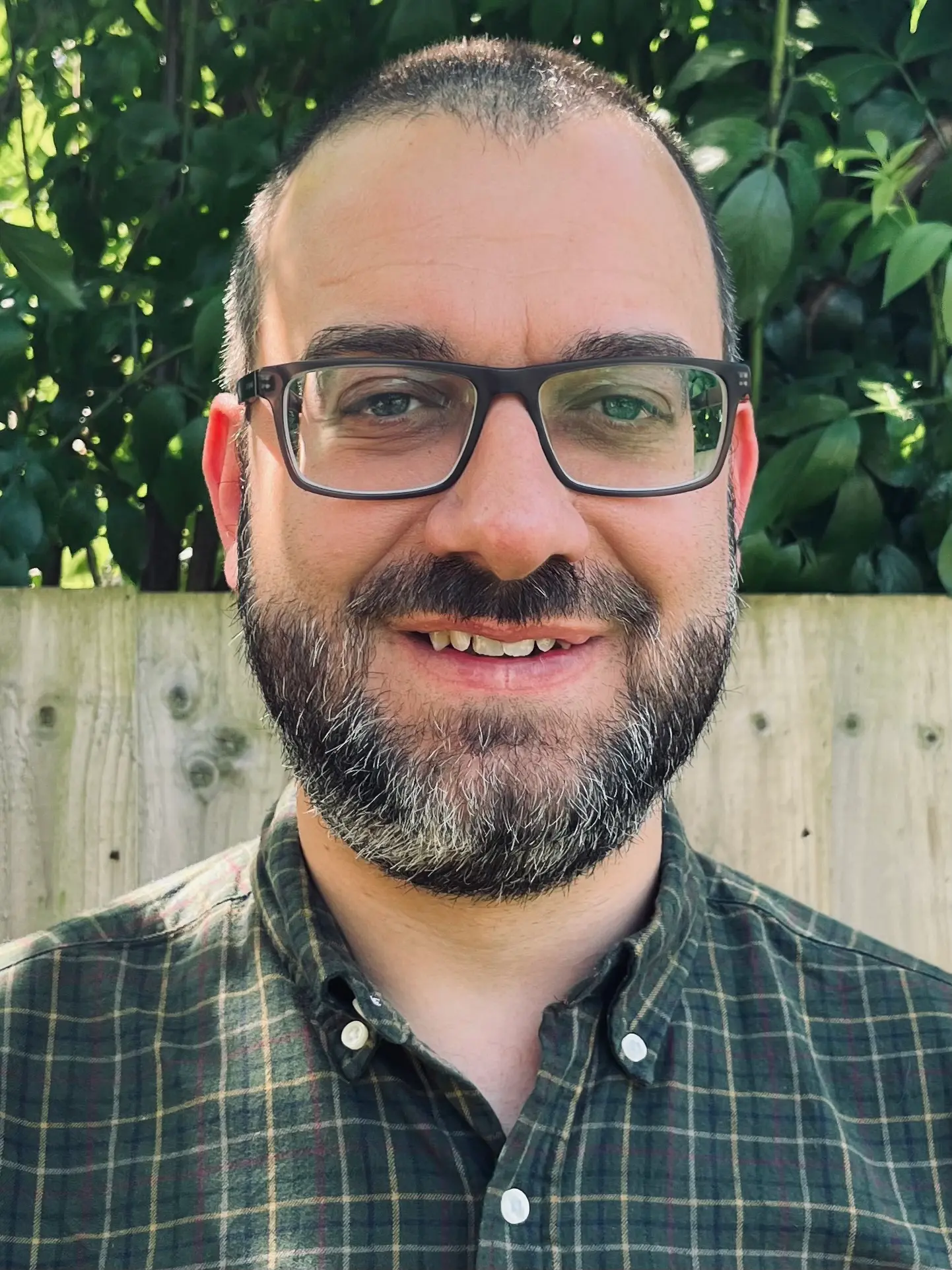Forget Me Not Children’s Hospice
- Founded in 2004
- Building new services for children and families
- Refreshed culture and board
- Every Minute Matters crowdfunding campaign
- forgetmenotchild.co.uk
I spoke to Luen Thompson, CEO of Forget Me Not Children’s Hospice (FMNCH) in Yorkshire, to learn more about the change of culture, board and new services that have enabled them to grow and help more families over the last 3 years. FMNCH recently completed a crowdfunding campaign, raising over £300,000 and enabling 100 more bereaved families to be supported through their services. We discussed the current opportunities and challenges the hospice faces and what the future might hold for Forget Me Not.
Tell me about the origin of FMNCH. When did you become the CEO?
“Forget Me Not has an interesting history because it began with a mum back in 2004 who couldn’t find support for her son when he was born and who was also a bit of a baker, so she spent quite a few years baking and raising money – up to £600,000!”
She established the organisation as a trust, so she could start recruiting people to work alongside her and make her vision a reality. She began offering hospice-at-home facilities initially, building up staffing and beneficiaries whilst continuing to raise money.
Once they had reached £4m, they could think about building a hospice and running it for a couple of years. They committed to a plot of land in 2011, where the hospice was built, and last year, celebrated its 10-year anniversary.
Today, what appears to be a traditional hospice, offers a much wider range of services, some of which are unique and award-winning. Luen Thompson became the CEO in 2018, bringing in some changes to refresh the culture and organisation, enabling the organisation to grow and continue to develop services that fill gaps in the support system.

I noticed you’ve recently run a campaign called Every Minute Matters. How did this initiative come about?
“One of the things that we recognised is that for all the children we work with that have a life-limiting condition and aren’t likely to survive into adulthood, there are a number of families who don’t get to experience a live birth, or it could only be a matter of minutes before they die.
We repeatedly heard of parents in this situation, leaving a maternity unit with nothing more than a leaflet and little support. These mums are at risk of developing post-traumatic stress disorder because at whatever stage a child is lost – it can be devastating if you don’t have the support around you that you need.”
FMNCH recognised that in West Yorkshire, there is a higher prevalence of this occurring, so ensuring that proper support is received is hugely important. In response, they started a service seven years ago, with the first funding coming from Children in Need.
“Over the years, we’ve developed that further with specialist neonatal nursing support. We have a consultant neonatologist who works with us and, very uniquely, a midwife. I think we’re the only Children’s Hospital in Europe that has a midwife.
She works with families to develop birth plans, much in the same way as usual, but with additional support to help people have as much control over the complex situation as possible. She also does translation work which helps families understand medical jargon and the vast amounts of information they might receive from the various appointments these families attend.
After the baby has been born, and whatever may happen after, many mums go on to have subsequent pregnancies and are understandably very anxious because of what has occurred during the previous pregnancy. Support is needed, so the midwife works with them again to ensure they are advocated for in the system and that the teams working with them understand the concerns going forward.
In addition, we run a series of groups called Rainbow Bumps and Rainbow Baby to provide peer support to these groups of women.
Every Minute Matters is a fundraising and awareness campaign that helps FMNCH to develop and continue these services and to support another 100 families who may find themselves in this position in West Yorkshire.”
How will match funding help you achieve your campaign goal for Every Minute Matters?
“We know it costs around £3,000 per family, roughly speaking. It’s never the same amount because people have different needs, but if we wanted to help a hundred families, we needed to find £300,000.”
Before the 48 hours of public crowdfunding, a private phase of funding was undertaken to get enough pledges and funds from trusts and major donors to equal the target of the public stage.
Do you have a large network of supporters to raise that amount in 48 hours? What did you do to promote it?
“Not really. The way that the campaign is set up to work is that team leaders are recruited, who act as advocates, which would usually include existing corporate supporters, volunteers who operate through “Friends-Of” type groups, staff and families who have received a service from us.”
Around 340 of these team leaders were tasked with asking friends, family and contacts to support the campaign.
Each leader would bring in varying amounts but what made it compelling was “knowing that if you gave £10, that became £20 with match funding or £23 if you Gift Aided it.”
Of course, Luen recognises that there is more work to do in fundraising to turn new donors into long-term supporters.

Is that the first time you’ve done crowdfunding?
“Yes, we’ve never done anything like that before, but the organisation that we did it with, Charity Extra, had run a similar campaign with Noah’s Ark Hospice in London, who told us about the campaign”.
Luen and her Income Generation Director designed a similar campaign to help FMNCH, having seen it succeed in a hospice context.
Tell me about how you have reshaped the culture since becoming CEO at Forget Me Not.
“One of the things I recognised when I first joined the organisation, particularly from other charities that I’ve worked in as well, is a culture with an “us” and “them” scenario between service delivery and income generation. They tend not to be very connected, especially in a small organisation which we were; we only operate in West Yorkshire with about 130 staff and a turnover of around £4m.
If you can do something about the culture by helping to create a one-team towards the same end, you can do much more with the people you’ve got.
A number of our care staff, for example, took part in the Every Minute Matters campaign, which gave them an opportunity to be publicly very proud of the work that they do because they’re the ones that provide the hands-on care and work directly with the families – not the fundraising or shop team members. The people in our fundraising team and our shops are actually entirely dependent on the staff delivering the service. They have to understand what and how they do it so they can sell that to people interested in supporting you. It’s a symbiotic relationship, but in so many of the charities I’ve worked in, and when I came here, it was very separate. It’s taken quite a long time to build those connections between teams and get people to understand that we’re all headed in the same direction.”
Embedding the culture of working together is important. Luen said they have continued to work on this culture throughout the pandemic, despite setbacks in staffing, furloughing arrangements and hybrid working.
“We’ve also just launched our people promise, which is our commitment to our staff about:
-
- How we recruit and retain the best people.
-
- How we look after the people that we’ve got from a well-being point of view.
-
- How we look after our people from a learning and development point of view.
-
- How we recognise that we can only grow the organisation if we grow the people that are in it.
-
- How we help people develop a purple heart, as we call it, which is that advocacy piece about how you show off the work that you do.
-
- What tools you need to do that.
-
- And what can we do to help you to do that.”
How does that work with recruitment? Do you identify people who are part of that cultural fit already for your organisation or embed it in training?
“I think the thing about those cultural things is that you can train somebody to do fundraising; for example, you could put somebody through courses to help them with managing finances, or you could set up care team members to become nurses through apprenticeship schemes; what you can’t do is teach somebody values. They’ve either have them or not, and if they’ve got them, then they’ve got a lot of potential, and you can draw those values out of people to help them realise how valuable those things are.
There are just so many little things that people in our care team do that make such a massive difference to families, but because they do it every day, they don’t realise how important that is. So when you’re looking for somebody to work in your care team, it’s identifying that constant putting somebody else before yourself attitude. That doesn’t just apply to the delivery of care because we have to care for each other to work together effectively.”

You’ve got a new board. Was that part of the cultural shift?
“I don’t think we went out of our way to build a new board, but when I joined the organisation, I joined because there’d been a bit of a crisis”. So it was perhaps more of a need for a fresh start that new board members needed to be recruited.
Like the staff and volunteers, Luen and her team also thought about the skills they would need on the board to help lead the organisation effectively. “We have a skills matrix. We ask people to identify for themselves what they’re going to bring from a skill point of view.”
The other thing they considered was how they could reflect the diversity in the area they work in. So the new board needed to represent the locality well.
“It’s so important to have that visibility of leadership, and actually, it’s been really successful at bringing different ideas to the table and helping us to develop our thinking about how we reach out to more communities and help them to understand what’s an offer to them and break down those barriers.
We now also have 3 members of staff whose specific role is to support people in the Asian community and another to help people in the Eastern European community; there are significant Eastern European communities in West Yorkshire.”
This need was about allowing people to feel comfortable using Forget Me Not’s services and making a purposeful effort to understand them.
How do you come up with these new services? Is it to meet demand?
“The needs and demands, I think, are some of it, but some of it is just recognising where there are gaps and what resources you have in your control that could fill a gap.”
FMNCH created a new service 3 years ago to fill a few of these gaps, which won a Charity Award this year. This SUDIC (Sudden Unexpected Death in Childhood) service is designed for people who have had a child die but haven’t been previously associated with the hospice. They can use the same facilities to spend time with their child, as a family, to do the things they would want to do, such as walk around the garden.
There also might be a police process attached to some child deaths, so bereavement support is offered to help liaise between the family, police and social services. They help explain and demystify the procedures and help people process the death they have not anticipated. The service includes support for the whole family, whoever may need it, and they act as key workers in the system to provide any necessary counselling, consultative support or service.
Another initiative of FMNCH has been organising family days for baby loss awareness. Some of these are for families the hospice has supported, and others are public events for anybody who has lost a child at some point in their life. These provide an opportunity for people who have not been able to talk about it or did not receive support when it happened to connect with others who have been through similar experiences.
“I think there’s always been a bit of stigma about baby loss, and that stigma, I think, is partly because people don’t know what to say, and so things get brushed under the carpet. Then the person won’t know how to talk about it either, and it just becomes wrapped up inside, so they never tell anybody about it – but it never goes away.”
Do you work closely with the NHS?
“Yes. Sometimes the children aren’t well enough to be transferred from a hospital to a hospice, and they would die in transit, which would be the worst thing. So what we are able to do is provide in-reach services in the hospital with the family and child, imparting our very niche knowledge to the nursing team in the hospital.
It’s a funny thing about hospices. It’s a brick-and-mortar building, but an awful lot of the work we do is not in the hospice; it’s out in the community. We have a full hospice-at-home service which means anything you can have in the hospice, you can have at home as well, but we also provide a lot of in-reach working to hospitals.”

What future opportunities and challenges do you see for Forget Me Not?
Volunteering
Luen describes the need for volunteers, having lost many through the pandemic, which partly, like a lot of charities, is because many of them were older people who didn’t re-join after the pandemic.
“So we really need more volunteers. We are just working with a couple of consultants to do some trials around something that, if scalable, we’d run across all our shops. So we’ll see what comes out of that.
We also need to look at strategic partnerships around volunteers, such as with Duke of Edinburgh schemes or Probation Services. We are asking questions about how we find people who would benefit from volunteering and who will also give back to us. It has to be mutually beneficial.“
Finance
“We again, like all charities, are seeing costs go up, and we’ve got to think about how we will raise more income. Otherwise, all that happens is you stand still, and you can’t afford to stand still because people still need the services.”
Service provision
“The pandemic was hard for the families we help, so we realise there’s more we need to do around holistically looking at our service provision. Then I think the other thing that we learned during the pandemic is that there is a real shortage of facilities for children with very complex needs. They often end up being trapped in hospitals, which is not the right place for them because they haven’t necessarily got medical needs. A lot of them have social care needs, so there might be a different way of supporting them which we can help with.”
For more information about Forget Me Not, visit forgetmenotchild.co.uk







